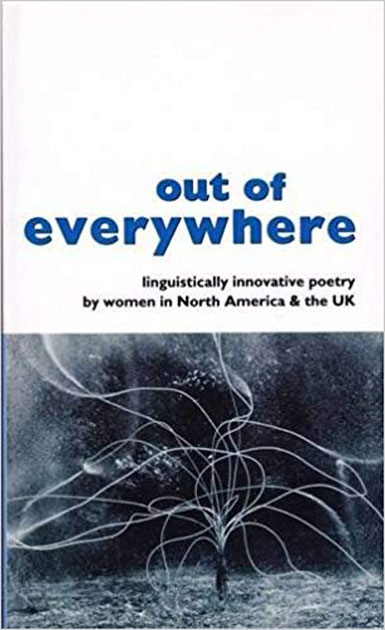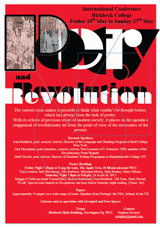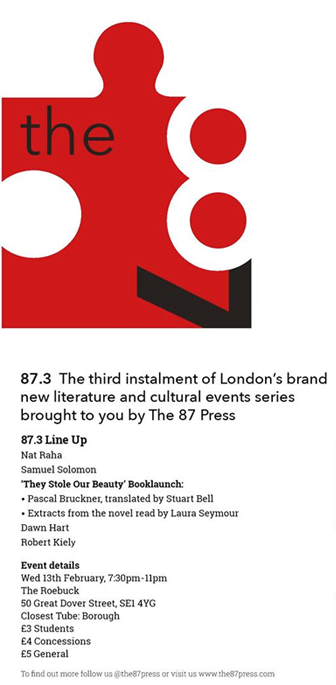 LISTS OF ONLINE RESOURCES from modernpoetry.org.uk
LISTS OF ONLINE RESOURCES from modernpoetry.org.uk Just What Is British Innovative Poetry?
Just What Is British Innovative Poetry? How Did British Innovative Poetry Come About?
How Did British Innovative Poetry Come About? Recent Anthologies
Recent Anthologies
 In recent years the nature of the British Innovative Poetry (BIP) community has I think substantially altered, and thus both the writing and the context in which it is made, presented and responded to. Most obviously is its increase in diversity, which attained a major step change in this decade. What started, as being of its time, yes, from the Sixties, all too monotonously white-blokeish of course, has transformed itself. Women centred innovative poetry activity had been proposed and encouraged by Maggie O'Sullivan's Out of Everywhere: Linguistically innovative poetry by women in north america & the UK (Reality Street, 1996) and the Anglo-American website How2 (1999–2008). Crucial more recent events in this country were a series of conferences: 2005 Forum on Women organised by a mixed group of at Birkbeck Contemporary Poetics Research Centre, and with many male participant writers; October 2006 Contemporary Experimental Women's Poetry Festival at Cambridge organised by Emily Critchley and Catherine Brown (again with a surprising number of male poets and presenters); and in July 2010 the extremely stimulating Women's Innovative Poetry & Cross Genre Festival, organised by Emily Critchley & Carol Watts at the University of Greenwich, absolutely in the hands of British and American female poets. The success and forward momentum of these events raised questions about the predictable emphases and biases within the whole innovative poetry community.
In recent years the nature of the British Innovative Poetry (BIP) community has I think substantially altered, and thus both the writing and the context in which it is made, presented and responded to. Most obviously is its increase in diversity, which attained a major step change in this decade. What started, as being of its time, yes, from the Sixties, all too monotonously white-blokeish of course, has transformed itself. Women centred innovative poetry activity had been proposed and encouraged by Maggie O'Sullivan's Out of Everywhere: Linguistically innovative poetry by women in north america & the UK (Reality Street, 1996) and the Anglo-American website How2 (1999–2008). Crucial more recent events in this country were a series of conferences: 2005 Forum on Women organised by a mixed group of at Birkbeck Contemporary Poetics Research Centre, and with many male participant writers; October 2006 Contemporary Experimental Women's Poetry Festival at Cambridge organised by Emily Critchley and Catherine Brown (again with a surprising number of male poets and presenters); and in July 2010 the extremely stimulating Women's Innovative Poetry & Cross Genre Festival, organised by Emily Critchley & Carol Watts at the University of Greenwich, absolutely in the hands of British and American female poets. The success and forward momentum of these events raised questions about the predictable emphases and biases within the whole innovative poetry community.
This change was brought to a head in October 2014, with the ruination of UK poetry — a general discussion forum that at this point had a wide membership amongst innovative poets. Some postings originally centred on accusations of sexual exploitation within an American innovative alt.lit scene were multiply discussed (like a forerunner to #metoo, demonstrating collective feminist and pro-feminist solidarity). Some male "interventions" in the debate were stupid, non-empathetic and just missing the actual dynamics of existent gender relations. One guilty party was probably just an insignificant proto alt.right wanker; the other two, shamefully! Kent Johnson, US based poet and socialist literary and cultural provocateur and activist, and oh lord! Keston Sutherland, leading radical British innovative poet, the crowning point of the Late Cambridge School etc. In a couple of hectic days many female poets left to join the already existing women's newslist, and many of the younger male poets also exited in sympathy. From this point on female-centred events became commonplace, and the number of young interesting female poets is continually and rapidly increasing. But alas, any mutual forum has probably shifted to the dubious embrace of Facebook. No shared neutral space (except of course, it turned out not to have been neutral in the first place.)
 Such change fitted also with the activism widespread at the beginning of this decade as response to the "Financial Crisis" of 2008 and the "austerity" that was neo-liberalism's cynical response. 2011 saw the summer riots across England, plus the influence of the American Occupy Movement, with conflict spreading to universities in the next couple of years. There was general support within the BIP community for radical political change, epitomised by the May 2012 Poetry and Revolution Conference at Birkbeck Poetics Research Centre, followed up by the Militant Poetics and Poetry Conference, again at Birkbeck the following year. There was a period of politically as well as poetically radical events such as, say, Benefits at Brag (July 2013): "An evening of poetry and performance with a focus on modernist/radical/experimental/avant-garde poetry and its intersections with other art forms and with political activism".
Such change fitted also with the activism widespread at the beginning of this decade as response to the "Financial Crisis" of 2008 and the "austerity" that was neo-liberalism's cynical response. 2011 saw the summer riots across England, plus the influence of the American Occupy Movement, with conflict spreading to universities in the next couple of years. There was general support within the BIP community for radical political change, epitomised by the May 2012 Poetry and Revolution Conference at Birkbeck Poetics Research Centre, followed up by the Militant Poetics and Poetry Conference, again at Birkbeck the following year. There was a period of politically as well as poetically radical events such as, say, Benefits at Brag (July 2013): "An evening of poetry and performance with a focus on modernist/radical/experimental/avant-garde poetry and its intersections with other art forms and with political activism".
Political revolution is still a long time a-coming, but liberal social change in society as a whole, and even within the weird subsystem of BIP, have accelerated. It was in the early 2010s that I was aware of the earliest innovative events presented in an LGBTQ context, such as are now regular events. A challenging queer innovative poetics is now being proposed and anthologised indeed. In February 2016 occurred another quasi academic event, Rapapuk: Race and Poetry and Poetics in the UK Conference. This also, perhaps all too typically, followed on from American events: "Following Boston Review's forum on 'Race and the Poetic Avant-Garde', co curated by Dorothy Wang, boundary2 published the dossier 'On Race and Innovation' this November. The Mongrel Coalition Against Gringpo continues to mobilise social media, disseminating their anti-racist and anti-colonial campaigns. The whiteness of the avant-garde and conceptual art and poetry has been disclosed, and readers, writers, and critics are asked to consider their complicity in a movement inextricable from its racialized and possibly racist origins." Though the Research Group was Anglo-American (Sam Solomon and Dorothy Wang), the event's steering committee included Robert Hampson, Nat Raha and Nisha Ramayya, and the event focused on a wide range of exclusions, particularly of course, race. Further events have followed — and it is clear that a break has somehow been made, and younger people from a more representative variety of backgrounds for contemporary Britain are now active within BIP. No longer a matter of a bunch of aging white blokes in a room over a pub, but diverse and varied scenes, yet including even a few aging white blokes like me.  An excellent exemplar would be The 87 Press Reading November 2018, with Nisha Ramayya & Edmund Hardy acting out in joyful intellectual play scenes of Classical Sanskrit drama (hilarious and unnerving equally), Callie Gardner launching Naturally It Is Not with a major reading; ecopoet Pratyusha launching Night Waters, and varied and exciting readings from Caspar Heinemann, Jenny Mitchell and Gloria Dawson, to a large crowd, yes, in a room over a pub, though with an audience decidedly mixed in age, gender & sexuality, and ethnic origin. Glorious!
An excellent exemplar would be The 87 Press Reading November 2018, with Nisha Ramayya & Edmund Hardy acting out in joyful intellectual play scenes of Classical Sanskrit drama (hilarious and unnerving equally), Callie Gardner launching Naturally It Is Not with a major reading; ecopoet Pratyusha launching Night Waters, and varied and exciting readings from Caspar Heinemann, Jenny Mitchell and Gloria Dawson, to a large crowd, yes, in a room over a pub, though with an audience decidedly mixed in age, gender & sexuality, and ethnic origin. Glorious!
Other tokens of healthy diversity, and of a poetry renewing its base: the support given to the wide range of poets feeling threatened by the xenophobic turn which the Brexit referendum/con trick switched on. Jèssica Pujol organised a reading in February 2017 in support of the pro-migrant One Day Without Us campaign, and from this sprung the large 2018 Boiler House Press anthology edited by Ágnes Lehóczkyamd J T Welsch, Wretched Strangers, centred on writing by poets who are migrants. And also, profoundly and long term, Stephen Fowler's continuous efforts since 2010: first the 99 Maintenant Interviews, and even more strongly all the events labelled Enemies or Camarades (from 2013) — focusing on collaborative projects, often between anglophone and non-anglophone poets — have helped create this sense of British Innovative Poetry being part of a European or even world poetic community, as well as the anglophone (often meaning USA dominated) one we had taken for granted.
As the people involved have changed, and with many more younger people becoming involved or interested, the nature of activities (and therefore the poetry) also changes. The ancient feud with "mainstream" poetry — oh no not the Poetry Society!!!!! — monstrous villains since 1977! — is pretty meaningless and stupid I suspect to anyone coming across this poetry freshly. What is this silly man on freaking out about? It was important to us once, but please just pass by if you want any excessive discussion you find in the archives. I suspect though you may well find much of what the Poetry Society pushes a little boring.
There are also two contrary trends now kicking up a lot of interesting stuff as they interact: the rise of careers in poetry, and the rapprochement between innovative poetry and the open mic scene. The former would once have been practically impossible as well as condemned as morally and spiritually polluted — yes, in a former baby boomer utopia. Life is now harder; yet also there are more opportunities for those able to manoeuvre through them. All these residencies, projects, academic co-options of poetry as creativity — go for it if you can do it well. For too long the world of the innovative poetry has been a solipsistic, Stirnerite wanky little fantasy project, incapable of acting within brute reality — an avant garde now over 100 years too late. We are getting somewhere if we are escaping that crap (— not the modernist impulse, but its fetishised repetition). We are communicating something important to others — not just to mirrors. On the other hand there needs to be care to avoid an institutionalisation of our poetry lest it becomes a self-satisfied quasi-academic coterie, whose members have all fulfilled a ritual cursus honorum to demonstrate they can belong to this elite.
 Fortunately the sense of poetry communicating what is vitally, immediately and humanly important lies within the recent rise of open-mic poetry events. These have gone beyond what I have always found the very restricted, formulaic and repetitive slam events. The performance of poetry has become an entertainment (Hey! It has always entertained me! — nothing ever as exciting in their different ways as Lee Harwood or John James reading when in their primes), an entry point for fresh poets and a basis for creative rethinking of what poetry is. A genuine populism to counter the potentially stultifying threat of academic co-option and recuperation.
Fortunately the sense of poetry communicating what is vitally, immediately and humanly important lies within the recent rise of open-mic poetry events. These have gone beyond what I have always found the very restricted, formulaic and repetitive slam events. The performance of poetry has become an entertainment (Hey! It has always entertained me! — nothing ever as exciting in their different ways as Lee Harwood or John James reading when in their primes), an entry point for fresh poets and a basis for creative rethinking of what poetry is. A genuine populism to counter the potentially stultifying threat of academic co-option and recuperation.
A final tendency must be mentioned. An early focus of attention for BIP was "place" —  as Olsonian influence, as distinguishing the poetry of this particular place from that other which is the culturally dominant USA, as a connection with vital and still live currents within the wider and older tradition of British poetry, and as a political locus (as Olson wanted). This may have helped the rise within BIP of the concept of eco-poetry and eco-poetics (with academic superstructure already built up). To be honest, the political debates of the early part of this decade seemed sometimes a rerun of the past, a retro 1968 that had learnt little and forgotten much. The real crisis is on a deeper level than Marxist analysis can reach (not to diss, comrades!) — it is of the survival of that net of ecosystems that have sustained us and all other life on this planet. The deep anger, rage, that must fill us, the urgent need for presenting what the full promise of life could be, these may be tasks for us to fulfil. Time to quit, as I'm sure you have, elitist Adornian pessimism, and to project, with full ability, a strong and genuine utopian fantasy of where we must be if we are all not either to die or to have to survive under the most abjected conditions in a nightmare parody of genuine humanity.
as Olsonian influence, as distinguishing the poetry of this particular place from that other which is the culturally dominant USA, as a connection with vital and still live currents within the wider and older tradition of British poetry, and as a political locus (as Olson wanted). This may have helped the rise within BIP of the concept of eco-poetry and eco-poetics (with academic superstructure already built up). To be honest, the political debates of the early part of this decade seemed sometimes a rerun of the past, a retro 1968 that had learnt little and forgotten much. The real crisis is on a deeper level than Marxist analysis can reach (not to diss, comrades!) — it is of the survival of that net of ecosystems that have sustained us and all other life on this planet. The deep anger, rage, that must fill us, the urgent need for presenting what the full promise of life could be, these may be tasks for us to fulfil. Time to quit, as I'm sure you have, elitist Adornian pessimism, and to project, with full ability, a strong and genuine utopian fantasy of where we must be if we are all not either to die or to have to survive under the most abjected conditions in a nightmare parody of genuine humanity.
So — this little site is given its last recast at a point when I welcome what BIP is transforming into. Whatever this site represents as a viewpoint on the writing and where it comes from will need to be taken up by others, more embedded in the more vital currents now flowing. Hopefully, as a final gesture of where I think our, your, future, lies: I'm not always as enthusiastic as someone from my generation might be expected to be at the celebration and upholding of the work of the now many dead poets of our lineage. I want to look forward, not back. Innovation comes from the encouragement of the new, not the study and memorialising of a set canon. I hope this site does not encourage such. Use the poetry, misuse it, mix and blend it, do precisely the opposite, anything genuine and innovative and making something new and active within our world.
To finish with what I have often posted — if anyone wants to take on, not these words and pages, but the principle they represent and work afresh with www.modernpoetry.org.uk — I'll gladly transfer the domain name to you. The present and the future are yours to take.